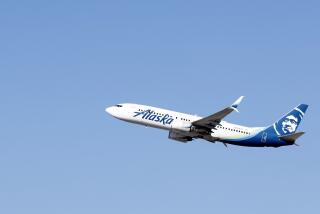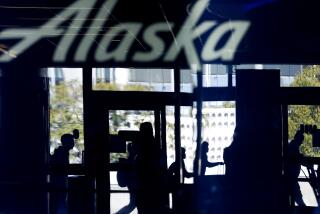One year ago, Dr. David Dao was dragged off a United flight. Here’s how flying has changed, and how it hasn’t
It started with a passenger refusing to give up his seat aboard a Sunday evening United Express flight from Chicago to Louisville, Ky., last April to make room for airline employees.
Within 24 hours, cellphone video of the bloodied 69-year-old man being dragged down the aisle had gone viral, sparking outrage worldwide and embroiling United Airlines in one of the worst public relations crises in its history.
Legislators hauled executives from United and other airlines to Capitol Hill and threatened new regulations. United Chief Executive Oscar Munoz promised a “culture shift” and a list of policy changes, including additional employee training and limiting use of law enforcement on aircraft to safety and security issues. Other airlines chimed in with plans to limit problems resulting from overbooking.
A year later, airlines have followed through on promises to help prevent some of the worst experiences passengers can have while flying. But the everyday annoyances and indignities that also drew attention in the wake of the incident remain — in part because, for many passengers, price remains the priority.
“There was a sense of, ‘We’re mad as hell, and we’re not going to take it anymore,’ ” said Gary Leff, a travel expert who writes the View from the Wing blog. “People are still frustrated with air travel, but the moment has largely passed.”
On April 9, 2017, four United Express crew members who needed to make it to Louisville for work were moved to a later flight due to a maintenance issue. Passengers had already been called to board the fully booked plane, and when no one volunteered to give up their seat for an $800 travel voucher, the airline picked four people to bump — including Dr. David Dao of Elizabethtown, Ky., and his wife.
The other two selected passengers left, but Dao refused to budge. That’s when the airline called in Chicago Department of Aviation officers, who ultimately forced Dao from his seat and dragged him off the plane.
The backlash mounted when United initially was slow to apologize and appeared defensive. A couple of weeks later, rival American Airlines also wound up in the hot seat when a flight attendant was filmed arguing with passengers after reportedly yanking a stroller from a mother holding a baby.
The tide turns
When legislators summoned airline executives and industry leaders to appear before Congress a month later, some blamed the uproar over the Dao incident for rising tension between passengers and crew. Lawmakers complained about practices like overbooking and increasingly crowded cabins that left passengers feeling more like cargo than customers, while industry groups worried that fliers would feel entitled to flout the rules.
But by that time, Chicago-based United had reached an undisclosed settlement agreement with Dao, who declined to comment for this story through his attorneys. United also declined to make executives available for comment.
Exactly one month after Dao’s flight, United’s stock, which lost more than $500 million of its value in the immediate aftermath, was at an all-time high. At the airline’s annual meeting in May, shareholders didn’t ask a single question about the incident.
At the time, 38% of consumers said they’d be willing to pay extra to fly American rather than United, according to a survey from Morning Consult, which tracks consumers’ views on brands. But by November, only 14% were willing to pay extra to avoid United, and when the flights were evenly priced, consumers were almost evenly split between the carriers.
If consumers were avoiding the airline, it didn’t show up in passenger numbers. In all but one month since Dao’s flight, United reported flying more passengers than it had the prior year.
Travelers don’t always have many airlines to choose from, and many aren’t willing to accept a higher fare or less convenient schedule, or abandon hard-earned frequent flier perks, just to make a statement.
Andrew VanSingel, a Chicago tax attorney and frequent flier, said he tried to avoid United after a run of delayed flights a few years ago. But they’ve “partially redeemed themselves” after a handful of flights this year, which he booked when traveling to places his preferred carriers didn’t fly.
He heard about Dao’s treatment but didn’t think it affected his decisions. “I would only write off an airline if it wronged me personally,” he said.
Airlines’ changes
That doesn’t mean nothing has changed, especially when it comes to particularly dreaded travel situations.
United pledged not to ask law enforcement to remove customers from flights unless there is a safety or security issue. The airline has sought assistance from law enforcement with security issues on aircraft in “several instances” since that policy was introduced, though less frequently than in prior years, spokesman Charles Hobart said.
Airlines have been “pretty quick to turn difficult customer service situations into law enforcement problems,” said Leff, of the View from the Wing blog. Anecdotally, that seems less common at United since Dao’s flight, but there are too little data to say for sure, he said.
The clearest industrywide response has been a sharp decline in the involuntary bumping of passengers from overfull flights, which only happened to fewer than 1 in 10,000 fliers even before the Dao incident. From April to December, the share of passengers bumped against their will dropped nearly 60% across 12 major mainline U.S. carriers compared with the same period a year earlier, according to Department of Transportation statistics.
What changed? Some carriers are working harder to find volunteers, and some are cutting back on deliberate overbooking, a practice that helps airlines guard against lost revenue from no-shows but is unpopular with fliers.
Southwest Airlines said it stopped overselling flights in May, though some flights could still end up with more passengers than seats if, for instance, the airline had to substitute a smaller plane or transport crew members. The share of Southwest passengers getting bumped — including volunteers — fell nearly 70% during the April-to-December period compared with the year before.
United said it would reduce deliberate overbooking, particularly on small planes or the final flight of the day to a particular destination, when volunteers can be harder to come by. At United, passengers’ odds of being bumped involuntarily fell nearly 60% in the April-to-December period compared with a year earlier, a figure the airline says has continued dropping. Voluntary bumps fell nearly 40%.
To try to ensure more bumped passengers volunteer to switch flights, United and Delta Air Lines raised limits on the amount of compensation crews can offer as an incentive. United has awarded its new maximum payout, $10,000, at least once; it declined to say how frequently it has done so.
A change in the way United solicits volunteers also has helped the airline find the passengers who are most willing — and cheapest — to move. Since late last year, passengers checking in for flights that appear likely to be overbooked are asked whether they’d be willing to move to an alternate flight for a handful of suggested compensation amounts. Passengers also can write in their own sum, and United can identify the lowest bidders.
United’s moves were among a list of 10 policy changes the airline unveiled the day it settled with Dao, all of which have since been adopted.
“Flight 3411 was a defining moment for our United family and it is our responsibility — our mission — to make sure we all learn from this experience,” the airline said in a statement. “The changes we have implemented are designed to better serve our customers and empower our employees. We know we have more to do to become a great airline, which is why we are continuing to look at ways to improve.”
Other airlines are also still making changes in response to the incident. After legislators criticized airlines’ lengthy, tough-to-read contracts spelling out passengers’ rights and responsibilities and carriers’ policies for handling situations such as oversold flights, delays and cancellations, this week American posted a new version meant to be easier to understand.
Balance of power
Prospects for some of the legislation introduced in response to the incident are less clear.
Proposals to remove limits on compensation for bumped passengers and prohibit bumping passengers already on board unless safety, security or health is at risk were included in pending legislation to reauthorize the Federal Aviation Administration.
Regardless of whether those measures ultimately become law, Brian Kelly, founder and CEO of frequent-flier website the Points Guy, says he thinks Dao’s experience helped shift the balance of power between consumers and carriers by challenging the idea that airlines can be “a little authoritarian” with no consequences.
“The power of the consumer to rise up and demand the respect to be treated like a human — I think that message got across,” he said.
Airlines that perform reliably and seem better-liked by travelers also appear to be among the more profitable carriers, said Seth Kaplan, managing partner at Airline Weekly. That suggests “it’s in the airline’s interest to be nice” — something for consumers to cheer, he said.
Ongoing improvements in United’s punctuality, along with reductions in bumping, mean it’s likely to fare better on industry rankings like one scheduled to be published Monday, exactly a year after Dao’s flight.
Last year, United ranked eighth among the 12 carriers included in the Airline Quality Rating, an annual report tracking factors including how frequently airlines involuntarily bump passengers, mishandle bags, arrive on time and field customer complaints.
But it takes time for consumers’ perception of an airline to catch up to reality, and high-profile missteps don’t help, Kaplan said.
There’s one other area where United appears to have improved over the last year, industry watchers said: apologizing.
United’s early response to the incident, including a pair of statements from Munoz the following day — in which he apologized for having to “re-accommodate” customers and called Dao “disruptive and belligerent” in a letter to employees — only fueled the outrage.
By March, when a puppy died aboard a United plane after a flight attendant instructed a passenger to place the dog’s carrier in an overhead bin, the airline’s first statement said it took full responsibility and was “deeply sorry for this tragic accident.”
“You could see the evolution towards more contrition,” Kaplan said.
Kelly said he was shocked by the change in the airline’s tone.
“It’s definitely been one takeaway,” he said. “With the pitchfork mafia on social media, you can’t just deflect like you used to.”






